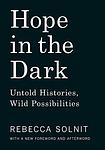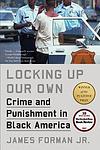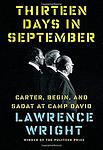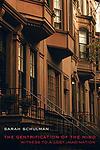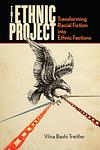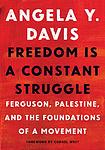The Greatest American "Nonfiction, Political" Books Since 2000
Click to learn how this list is calculated.
This list represents a comprehensive and trusted collection of the greatest books. Developed through a specialized algorithm, it brings together 305 'best of' book lists to form a definitive guide to the world's most acclaimed books. For those interested in how these books are chosen, additional details can be found on the rankings page.
Genres
The "Political" category of books encompasses works that explore the theory, practice, and history of government and politics. These books may cover topics such as political ideologies, political systems, political institutions, political movements, and political leaders. They may also examine the relationship between politics and other areas of society, such as economics, culture, and international relations. Political books can be both informative and thought-provoking, offering readers insights into the complexities of the political world and the challenges of governing in a democratic society.
Countries
Date Range
Reading Statistics
Click the button below to see how many of these books you've read!
Download
If you're interested in downloading this list as a CSV file for use in a spreadsheet application, you can easily do so by clicking the button below. Please note that to ensure a manageable file size and faster download, the CSV will include details for only the first 500 books.
Download-
26. The Assassins’ Gate: America In Iraq by George Packer
"The Assassins’ Gate: America In Iraq" by George Packer is a detailed account of the United States' involvement in Iraq following the 9/11 attacks. Packer provides an in-depth analysis of the political decisions, military strategies, and cultural misunderstandings that led to the disastrous and ongoing conflict. He also explores the personal stories of soldiers, diplomats, and Iraqis affected by the war. The book offers a critical examination of American foreign policy and its consequences, making it a thought-provoking read for anyone interested in the history of the Iraq War.
The 6928th Greatest Book of All Time -
27. The Nine: Inside The Secret World Of The Supreme by Jeffrey Toobin
"The Nine" by Jeffrey Toobin provides an in-depth look at the inner workings of the Supreme Court, focusing on the years between 2005 and 2007. Toobin explores the personalities, ideologies, and decisions of the nine justices who serve on America's highest court, including the contentious nominations of John Roberts and Samuel Alito. He also delves into landmark cases such as Bush v. Gore and the legalization of same-sex marriage. Through interviews with justices and their clerks, as well as extensive research, Toobin offers a fascinating glimpse into the secretive world of the Supreme Court.
The 7145th Greatest Book of All Time -
28. The Blank Slate by Steven Pinker
"The Blank Slate" challenges the conventional belief that human behavior is largely shaped by the environment and experience, arguing instead that genetics play a significant role. The book delves into the controversies surrounding this concept, exploring the implications it has on politics, violence, child-rearing, and the arts. It also argues that acknowledging our innate traits can lead to a more humane society, as it would allow for a better understanding of our strengths, weaknesses, and individual differences.
The 7161st Greatest Book of All Time -
29. Regarding the Pain of Others by Susan Sontag
The book is a deep exploration of how we perceive and engage with images of suffering and atrocity, particularly through photography. It critically examines the role of visual media in shaping our understanding of war, violence, and tragedy, questioning the ethics and impact of spectatorship. The author delves into the history of war photography, the intentions behind capturing such images, and the desensitization that can occur from repeated exposure. The text challenges readers to consider their own responses to these images and the complex interplay between empathy, conscience, and the consumption of others' pain.
The 7166th Greatest Book of All Time -
30. Eating Animals by Jonathan Safran Foer
This book is an in-depth exploration of the ethical, environmental, and health consequences of consuming animal products. The author's investigation includes visits to factory farms, conversations with farmers, butchers, and food safety advocates, and a deep dive into the cultural implications of food choices. The narrative combines personal experiences, philosophical inquiries, and factual data, challenging readers to consider the moral implications of their dietary choices.
The 7768th Greatest Book of All Time -
31. The Dark Side by Jane Mayer
"The Dark Side" by Jane Mayer is a non-fiction book that explores the use of torture and other controversial tactics by the United States government in the aftermath of the 9/11 attacks. Mayer details the decision-making process behind the use of enhanced interrogation techniques, and the legal and ethical debates surrounding them. She also examines the impact of these tactics on the individuals who were subjected to them, as well as the broader implications for American democracy and human rights. The book draws on extensive research and interviews with key players in the Bush administration, as well as classified documents and memos.
The 7823rd Greatest Book of All Time -
32. Politics by Hendrik Hertzberg
"Politics" is a collection of essays and commentaries that delve into the intricacies of American political life and governance. The book offers a sharp, insightful look at the landscape of U.S. politics, examining the ideologies, personalities, and events that have shaped the nation's public affairs. Through a series of eloquent and often witty pieces, the author provides readers with a deep understanding of the political process, the power of rhetoric, and the role of the media, all while advocating for progressive values and reforms. The work serves as both a critique and a celebration of American democracy, highlighting the author's passion for civic engagement and the continuous quest for a more equitable society.
The 7828th Greatest Book of All Time -
33. The Frugal Superpower: America's Global Leadership in a Cash-Strapped Era by Michael Mandelbaum
This book explores the impact of America's economic constraints on its global leadership role. The author argues that the growing national debt and the need to focus on domestic issues will force the United States to reevaluate and limit its international commitments. The book also examines potential scenarios for the world order if America withdraws from its global leadership role, ranging from a more multipolar system to the rise of more aggressive powers. The author emphasizes the need for careful management of this transition to avoid instability and conflict.
The 7859th Greatest Book of All Time -
34. Gulag: A History by Anne Applebaum
"Gulag: A History" provides an in-depth historical account of the Soviet Union's forced labor camp system, known as the Gulag. The book explores the inception of these camps during the reign of Vladimir Lenin, their expansion under Joseph Stalin, and their eventual decline and closure. It also delves into the daily lives of the prisoners, their hardships, and the brutal conditions they endured. The book is based on a wealth of archival material, personal interviews, and memoirs, offering a comprehensive understanding of one of the darkest periods in human history.
The 8048th Greatest Book of All Time -
35. Malcolm X: A Life of Reinvention by Manning Marable
This biography provides an in-depth exploration of Malcolm X's life, from his early days of crime and imprisonment to his transformation into one of the most influential African-American leaders. It delves into his complex relationships, his evolving political beliefs, and his controversial views on race and religion. The book also examines his assassination, shedding new light on the circumstances around his death and the conspiracy theories that followed.
The 8196th Greatest Book of All Time -
36. Hope in the Dark by Rebecca Solnit
"Hope in the Dark" is a powerful and inspiring exploration of the transformative power of hope in times of uncertainty. The book challenges the notion that hope is a passive emotion, instead arguing that it is an active process that can inspire change and action. Using a series of historical examples, the author demonstrates how hope has been a driving force in social and political movements, and encourages readers to remain hopeful, even in the face of seemingly insurmountable challenges.
The 8331st Greatest Book of All Time -
37. Bad Blood by John Carreyrou
This book delves into the riveting true story of a Silicon Valley startup that promised to revolutionize the medical industry with a groundbreaking device that could perform a full range of laboratory tests using just a few drops of blood. However, the company's charismatic founder's ambition and the immense pressure to succeed led to one of the most notorious cases of corporate fraud in recent history. Through extensive reporting and interviews, the narrative exposes how the company's misleading claims, toxic workplace culture, and unethical business practices put patients at risk, eventually leading to its dramatic downfall. The investigation into the company's practices not only captivated the nation but also raised critical questions about innovation, integrity, and regulation in the tech industry.
The 8333rd Greatest Book of All Time -
38. The Wisdom Of Crowds by James Surowiecki
This book explores the concept that large groups of people are smarter than an elite few, no matter how brilliant, and are better at solving problems, fostering innovation, coming to wise decisions, even predicting the future. The author delves into a wide range of disciplines, including popular culture, psychology, and behavioral economics to demonstrate how this concept works in the real world. The book also examines how group decisions can go wrong and provides insights on how to prevent these errors.
The 8376th Greatest Book of All Time -
39. Enlightenment Now by Steven Pinker
The book presents a comprehensive case for optimism in the modern era, arguing that humanity has made significant progress in various aspects such as health, prosperity, safety, peace, knowledge, and happiness, largely due to the values of the Enlightenment—reason, science, humanism, and progress. The author challenges the pervasive sense of pessimism in contemporary discourse and defends the scientific mindset and rational thinking as the driving forces behind improvements in human well-being. By analyzing a wealth of data and trends, the book encourages readers to appreciate the progress achieved and to continue embracing the Enlightenment principles to address current challenges and further advance the human condition.
The 8384th Greatest Book of All Time -
40. After The Music Stopped: The Financial Crisis, The Response, And The Work Ahead by Alan S. Blinder
After the Music Stopped is a comprehensive analysis of the 2008 financial crisis and its aftermath. Alan S. Blinder, a former vice chairman of the Federal Reserve, examines the causes of the crisis, the government's response to it, and the ongoing challenges facing the global economy. Blinder argues that the crisis was caused by a combination of factors, including lax regulation, excessive risk-taking, and a housing bubble. He also explores the various policy responses to the crisis, including the Troubled Asset Relief Program (TARP) and the Dodd-Frank Wall Street Reform and Consumer Protection Act. Finally, Blinder offers recommendations for preventing future financial crises and ensuring long-term economic stability.
The 8453rd Greatest Book of All Time -
41. Days Of Fire: Bush And Cheney In The White House by Peter Baker
"Days of Fire" is a comprehensive account of the presidency of George W. Bush and his vice president, Dick Cheney, during their eight years in the White House. Peter Baker, a journalist who covered the Bush administration for The New York Times, provides a detailed analysis of the key events and decisions that shaped their time in office, including the 9/11 attacks, the wars in Iraq and Afghanistan, Hurricane Katrina, and the financial crisis. Through interviews with key players and extensive research, Baker offers a nuanced portrait of two men who were both praised and vilified for their leadership and legacy.
The 8453rd Greatest Book of All Time -
42. Locking Up Our Own: Crime and Punishment in Black America by James Forman
This book delves into the complex and controversial issue of mass incarceration in the United States, particularly within the African American community. It explores the historical, social, and political factors that contributed to the high rates of black imprisonment. The author examines the role of African American leaders in advocating for tough-on-crime policies and their unintended consequences. The book is a thought-provoking analysis of the intersection of race, crime, and justice in America.
The 8495th Greatest Book of All Time -
43. Thinking The Twentieth Century by Tony Judt, Timothy Snyder
This book is a profound intellectual history of the 20th century, presented through a series of engaging conversations between two eminent historians. It explores the major ideological currents of the century, including Marxism, socialism, liberalism, and fascism, while also delving into the personal experiences and reflections of one of the authors, who was facing a terminal illness during the discussions. The dialogue format allows for a dynamic exploration of how historical events, personal experiences, and intellectual debates have shaped our understanding of the modern world. Through these conversations, the book offers insights into the role of intellectuals and politicians in navigating the complex political landscapes of the 20th century, making it a compelling read for anyone interested in history, politics, and the power of ideas.
The 8515th Greatest Book of All Time -
44. Slavery by Another Name by Douglas A. Blackmon
The book explores the concept of "neoslavery," which entrapped thousands of African Americans in the South in a system of forced labor after the Civil War. This system was perpetuated by local laws, racial prejudice, and economic manipulation, where black men were arrested on false charges, then sold to companies as cheap labor. The book illuminates the forgotten history of this "age of neoslavery" that persisted into the 20th century and its profound impact on the racial disparities that exist today.
The 8558th Greatest Book of All Time -
45. Thirteen Days In September: Carter, Begin, And Sadat At Camp David by Lawrence Wright
"Thirteen Days In September" by Lawrence Wright is a detailed account of the historic peace negotiations that took place between President Jimmy Carter, Israeli Prime Minister Menachem Begin, and Egyptian President Anwar Sadat at Camp David in September 1978. The book provides a behind-the-scenes look at the intense negotiations and personal dynamics between the leaders, as they worked to reach a peace agreement that would end decades of conflict in the Middle East. Wright's narrative is a gripping and informative account of a pivotal moment in modern history.
The 8571st Greatest Book of All Time -
46. The Gentrification of the Mind by Sarah Schulman
"The Gentrification of the Mind" is a critical examination of the impact of the AIDS epidemic on American society and culture, particularly in relation to urban gentrification. The author argues that the loss of a generation of artists, writers, and thinkers due to the AIDS crisis led to a homogenization of culture and thought, similar to the way gentrification leads to a homogenization of urban neighborhoods. The book is a powerful critique of the erasure of diverse voices and experiences, and a call to remember and honor the lost history of those affected by the epidemic.
The 8576th Greatest Book of All Time -
47. Threatening Anthropology by David H. Price
"Threatening Anthropology" delves into the chilling impact of McCarthy-era surveillance and repression on the field of anthropology in the United States during the mid-20th century. The book meticulously examines how government scrutiny and accusations of subversion or communist sympathies led to career disruptions, personal betrayals, and significant shifts in the research and methodologies of anthropologists. Drawing on extensive FBI documents, the narrative reveals the broader consequences of political fear on academic freedom and intellectual discourse, highlighting the struggles of targeted scholars and the chilling effect on their work and lives.
The 8584th Greatest Book of All Time -
48. Nixonland by Rick Perlstein
"Nixonland" is a detailed historical account of the political and social climate in America from the mid-1960s to mid-1970s, focusing on the rise and fall of President Richard Nixon. The book explores the divisive issues of the time, including the Vietnam War, civil rights, and the Watergate scandal, and how Nixon's manipulation of public fears and prejudices led to a new era of American conservatism. It also delves into the impact of these events on American politics and society, creating a landscape that still resonates today.
The 8940th Greatest Book of All Time -
49. The Ethnic Project by Vilna Bashi Treitler
The book in question explores the complex dynamics of race and ethnicity in the United States, examining how various immigrant groups have navigated and shaped their identities within the country's racial hierarchy. It delves into the historical and sociological processes that have led to the assimilation of certain ethnic groups into the category of "whiteness," while others remain marginalized. Through a critical analysis of these ethnic projects, the book reveals the strategies employed by different groups to gain social acceptance and economic mobility, and how these efforts have contributed to the perpetuation of racial inequalities. The narrative challenges readers to reconsider the constructs of race and ethnicity and their impact on American society.
The 9032nd Greatest Book of All Time -
50. Freedom Is A Constant Struggle by Angela Davis
This book is a collection of essays, speeches, and interviews that delve into the interconnectedness of struggles against state violence and oppression throughout history and around the world. The author, a prominent activist and scholar, draws parallels between various movements for social justice, including the civil rights movement in the United States, the fight against apartheid in South Africa, and the Palestinian liberation struggle. She emphasizes the importance of collective action and the need for solidarity across different causes, arguing that the fight for freedom is an ongoing and universal endeavor that requires persistence and an understanding of the historical and global contexts of resistance.
The 9185th Greatest Book of All Time
Reading Statistics
Click the button below to see how many of these books you've read!
Download
If you're interested in downloading this list as a CSV file for use in a spreadsheet application, you can easily do so by clicking the button below. Please note that to ensure a manageable file size and faster download, the CSV will include details for only the first 500 books.
Download









